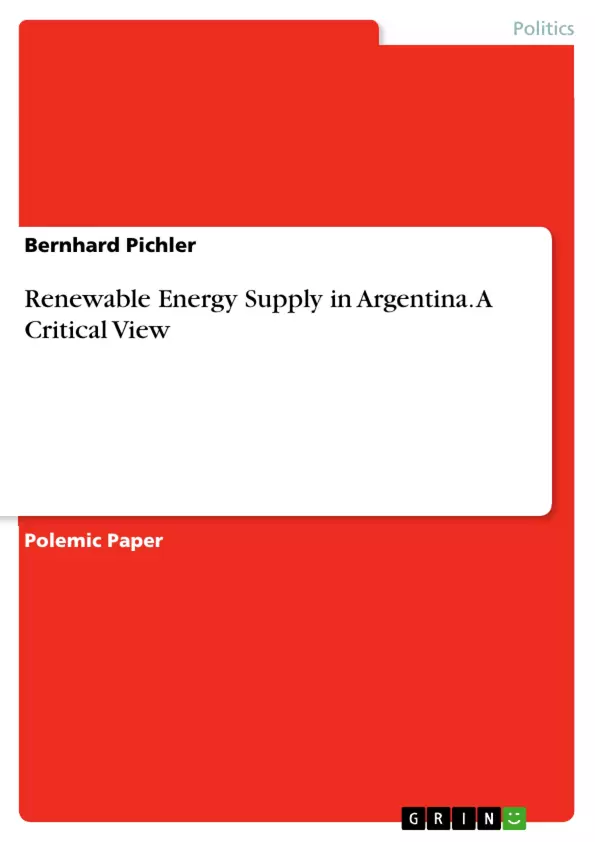This article aims to consider and analyze critically the topic of renewable energies. The focus in this consideration is set on Argentina, as it is one of the best-known model countries in the implementation of "Renewable Energy". This article examines Argentina’s energy policies and their efficiency. In addition, a short comparison with China is drawn up and the position of the UN is considered. In this context, the theory of global warming due to human caused CO2 emissions will also be discussed. At first, however, the article begins with the definition of renewable energies.
In order to properly explore the topic of “renewable energy supply in Argentina”, it is necessary to define the term of “renewable energy”. According to the webpage ScienceDaily a renewable energy is from an energy resource that is replaced rapidly by a natural process such as power generated from the sun or from the wind. At Wikipedia, we can read, that renewable energy is mainly collected from renewable resources, which are naturally replenished on a human timescale, such as sunlight, wind, rain, tides, waves and geothermal heat.
However, these general definitions do not consider the efficiency of so-called renewable energy power plants or a possible additional consumption of natural resources. These issues, as well as possible emissions from this type of energy production will be discussed subsequently in this article.
Table of Contents
- Introduction
- Definition
- Energy Supply in Argentina
- Comparison with China's energy mix
- Position of the United Nations (UN)
- Critical Aspects
- CO2-emissions
- Conclusion
- Sources
Objectives and Key Themes
This article aims to critically examine the topic of renewable energies, particularly focusing on Argentina and comparing it to China. The article also explores the position and perspective of the United Nations on renewable energies, including the theory of global warming caused by human-induced CO2 emissions.
- Definition and efficiency of renewable energy
- Argentina's energy supply and mix, including hydropower, wind, and fossil fuels
- Comparison of Argentina's energy mix with China's, highlighting the role of coal in China
- The position of the United Nations on renewable energies and the reduction of fossil fuel consumption
- Critical aspects of renewable energy, such as environmental impacts and economic feasibility
Chapter Summaries
- Introduction: This chapter introduces the article's focus on renewable energies, particularly in Argentina, and its intention to critically analyze the subject, including comparisons with China and the UN's perspective.
- Definition: This chapter defines renewable energy, exploring different sources and definitions, while also highlighting the potential limitations and considerations regarding efficiency and resource consumption.
- Energy Supply in Argentina: This chapter analyzes Argentina's energy supply, presenting conflicting information from various sources regarding the reliance on fossil fuels versus renewable energy sources, particularly hydropower. It emphasizes the importance of wind energy in Argentina and the challenges related to natural gas reserves and energy consumption.
- Comparison with China's energy mix: This chapter compares Argentina's energy mix with China's, highlighting China's significant reliance on coal and its impacts on global energy markets.
- Position of the United Nations (UN): This chapter explores the United Nations' stance on renewable energies and its aim to drastically reduce fossil fuel consumption due to concerns about climate change. It also mentions the UN's target of limiting global warming to 1.5%.
- Critical Aspects: This chapter delves into critical aspects of renewable energies, such as the high production costs, dependence on rare earth materials, inefficient energy production, and potential environmental impacts.
Keywords
This article focuses on the keywords and concepts of renewable energy, energy efficiency, Argentina, China, CO2 emissions, energy mix, and sustainability, while presenting a critical view of the topic.
Frequently Asked Questions
How is renewable energy defined in this article?
Renewable energy is defined as energy from resources that are naturally replenished on a human timescale, such as sunlight, wind, rain, and geothermal heat.
Why is Argentina considered a model country for renewable energy?
Argentina is recognized for its significant implementation of renewable energy policies, particularly focusing on wind and hydropower.
How does Argentina's energy mix compare to China's?
While Argentina focuses increasingly on renewables and gas, China relies heavily on coal, which has a major impact on global CO2 emissions.
What is the United Nations' position on renewable energy?
The UN aims to drastically reduce fossil fuel consumption to limit global warming to 1.5% and promotes sustainable energy development.
What are the critical aspects of renewable energy mentioned?
Critical points include high production costs, dependence on rare earth materials, and potential environmental impacts of large-scale plants.
What role does CO2 play in the discussion?
The article discusses the theory of global warming caused by human-induced CO2 emissions and how energy policies aim to mitigate this.
- Citation du texte
- Bernhard Pichler (Auteur), 2019, Renewable Energy Supply in Argentina. A Critical View, Munich, GRIN Verlag, https://www.grin.com/document/967707



